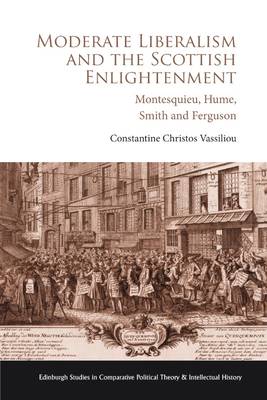
- Afhalen na 1 uur in een winkel met voorraad
- Gratis thuislevering in België vanaf € 30
- Ruim aanbod met 7 miljoen producten
- Afhalen na 1 uur in een winkel met voorraad
- Gratis thuislevering in België vanaf € 30
- Ruim aanbod met 7 miljoen producten
Zoeken
Moderate Liberalism and the Scottish Enlightenment
Montesquieu, Hume, Smith and Ferguson
Constantine Christos Vassiliou
€ 193,45
+ 386 punten
Omschrijving
Moderate Liberalism and the Scottish Enlightenment responds to a perennial problem in political theory: how to balance commercial considerations with the public good. It investigates this dilemma through the lenses of Enlightenment thinkers whose liberal theories responded to the hazards of commercial innovation during capitalism's nascent stages. Vassiliou argues that Montesquieu, David Hume, Adam Smith, and Adam Ferguson represent a moderate perspective in foundational liberal thought, which emphasizes the critical importance of honour. He compares how their liberal theories uniquely channel human beings' desire for honour to nourish a sense of interpersonal magnanimity within an inward-looking, liberal commercial world. In an age of polarized extremes, we have witnessed restive democracies flirting with populist, illiberal responses for managing the hazards of capitalist innovation. Montesquieu and his Scottish counterparts' foundational liberal theories offer us more viable, middle-ground prescriptions which are sensitive to the emotional constitution of a liberal society.
Specificaties
Betrokkenen
- Auteur(s):
- Uitgeverij:
Inhoud
- Aantal bladzijden:
- 240
- Taal:
- Engels
- Reeks:
Eigenschappen
- Productcode (EAN):
- 9781399521192
- Verschijningsdatum:
- 3/07/2023
- Uitvoering:
- Hardcover
- Formaat:
- Genaaid
- Afmetingen:
- 156 mm x 234 mm
- Gewicht:
- 489 g

Alleen bij Standaard Boekhandel
+ 386 punten op je klantenkaart van Standaard Boekhandel
Beoordelingen
We publiceren alleen reviews die voldoen aan de voorwaarden voor reviews. Bekijk onze voorwaarden voor reviews.











